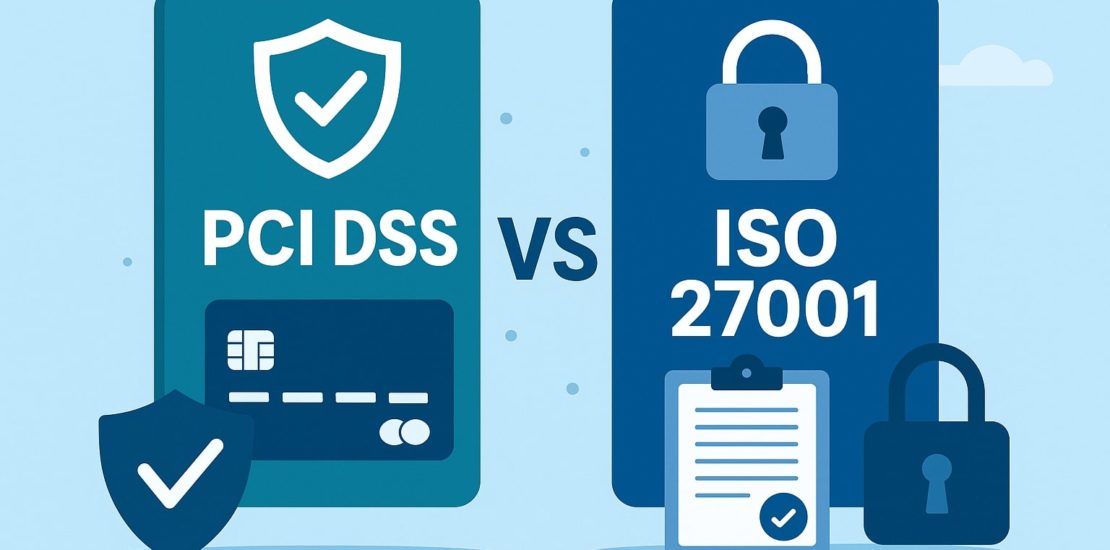PCI DSS vs. ISO 27001: Which Standard Offers Better Data Protection?
- September 15, 2025
- Posted by: Gradeon
- Category: Compliance

In today’s digital economy, businesses handle sensitive information on a daily basis. From customer payment details to confidential corporate data, organisations are under immense pressure to protect against breaches and cyber threats. Two of the most widely recognised frameworks that address this challenge are the Payment Card Industry Data Security Standard (PCI DSS) and the ISO/IEC 27001 Information Security Management Standard.
While both standards aim to enhance data security, they differ in scope, application, and approach. Understanding the distinction between PCI DSS and ISO 27001 is essential for businesses looking to choose the right compliance path—or, in some cases, pursue both.
What is PCI DSS?
PCI DSS was developed by the Payment Card Industry Security Standards Council (PCI SSC), a body formed by major credit card brands including Visa, MasterCard, American Express, Discover, and JCB. Its primary focus is protecting cardholder data and reducing credit card fraud.
PCI DSS compliance is mandatory for any organisation that stores, processes, or transmits payment card information.
Key requirements of PCI DSS include:
- Protecting cardholder data through encryption and masking.
- Installing and maintaining secure firewalls and systems.
- Regularly monitoring and testing networks for vulnerabilities.
- Restricting access to cardholder data to authorised personnel only.
- Maintaining an information security policy.
In short, PCI DSS is a highly specialised framework designed for organisations handling payment transactions.
What is ISO 27001?
ISO/IEC 27001 is an international standard for managing information security. Published by the International Organization for Standardization (ISO) and the International Electrotechnical Commission (IEC), it outlines the requirements for an Information Security Management System (ISMS).
Unlike PCI DSS, ISO 27001 has a broader scope. It applies to all types of organisations—government agencies, financial institutions, healthcare providers, and even SMEs—that want to secure their overall information assets.
Key elements of ISO 27001 include:
- Conducting risk assessments and applying appropriate security controls.
- Establishing policies for information security management.
- Ensuring leadership commitment to security practices.
- Continuous monitoring, auditing, and improvement of ISMS.
- Training and raising awareness among employees.
ISO 27001 certification is voluntary but widely regarded as a mark of credibility and trust in data security practices.
The Key Differences Between PCI DSS and ISO 27001
Although both standards focus on protecting information, their application and scope differ significantly.
| Aspect | PCI DSS | ISO 27001 |
| Focus | Payment card data security | Comprehensive information security management |
| Scope | Organisations processing, storing, or transmitting cardholder data | Any organisation seeking to protect information assets |
| Mandatory or Voluntary | Mandatory for entities handling card payments | Voluntary but highly recommended for best practices |
| Approach | Prescriptive – specific technical requirements | Risk-based – tailored to organisational risks |
| Certification | Validated by a Qualified Security Assessor (QSA) or Self-Assessment Questionnaire (SAQ) | Independent audit leading to ISO 27001 certification |
| Updates | Regular updates from PCI SSC to address evolving threats | Periodic revisions by ISO/IEC, adaptable to various industries |
Which Standard Offers Better Data Protection?
The question of whether PCI DSS or ISO 27001 offers better protection depends on the organisation’s needs. Both standards play crucial roles but serve different purposes.
When PCI DSS is better:
- If your business processes payments, PCI DSS is non-negotiable. Compliance ensures you are protecting sensitive cardholder data and avoiding heavy penalties.
- PCI DSS provides detailed, technical guidelines, making it highly effective in preventing card fraud.
When ISO 27001 is better:
- If your organisation handles various forms of information, including employee data, trade secrets, or intellectual property, ISO 27001 offers a comprehensive framework for protection.
- ISO 27001 is also ideal for companies that want to build customer trust and demonstrate commitment to global best practices.
Can Organisations Adopt Both?
Absolutely. Many organisations choose to implement both PCI DSS and ISO 27001. Here’s why:
- Compliance plus strategy: PCI DSS ensures compliance with card security rules, while ISO 27001 provides a strategic, risk-based approach for broader information security.
- Competitive advantage: Dual compliance demonstrates that your organisation not only meets payment security requirements but also takes a proactive approach to securing all forms of data.
- Reduced risks: Adopting both helps in covering specific as well as holistic risks, ensuring robust protection against cyber threats.
Challenges in Implementation
While both standards are valuable, achieving compliance can be challenging.
- PCI DSS may require significant investment in secure infrastructure and regular audits. For small businesses, this can be resource-intensive.
- ISO 27001 demands cultural and organisational change, as it involves continuous risk assessment, employee training, and management commitment.
Despite these challenges, the long-term benefits far outweigh the initial effort.
Final Thoughts
PCI DSS and ISO 27001 are not competing standards but rather complementary ones.
- PCI DSS is best for organisations directly handling payment card transactions. It is mandatory, prescriptive, and laser-focused on protecting cardholder data.
- ISO 27001 provides a flexible, risk-based framework that applies to all information assets, making it broader in scope and ideal for organisations seeking comprehensive information security.
So, which one offers better protection? The answer is: both, depending on your business context. If you handle payments, PCI DSS is essential. If you want to secure your organisation holistically, ISO 27001 is the better choice. And if you want to stay truly resilient in today’s threat landscape, adopting both will ensure you are protected from all angles.
